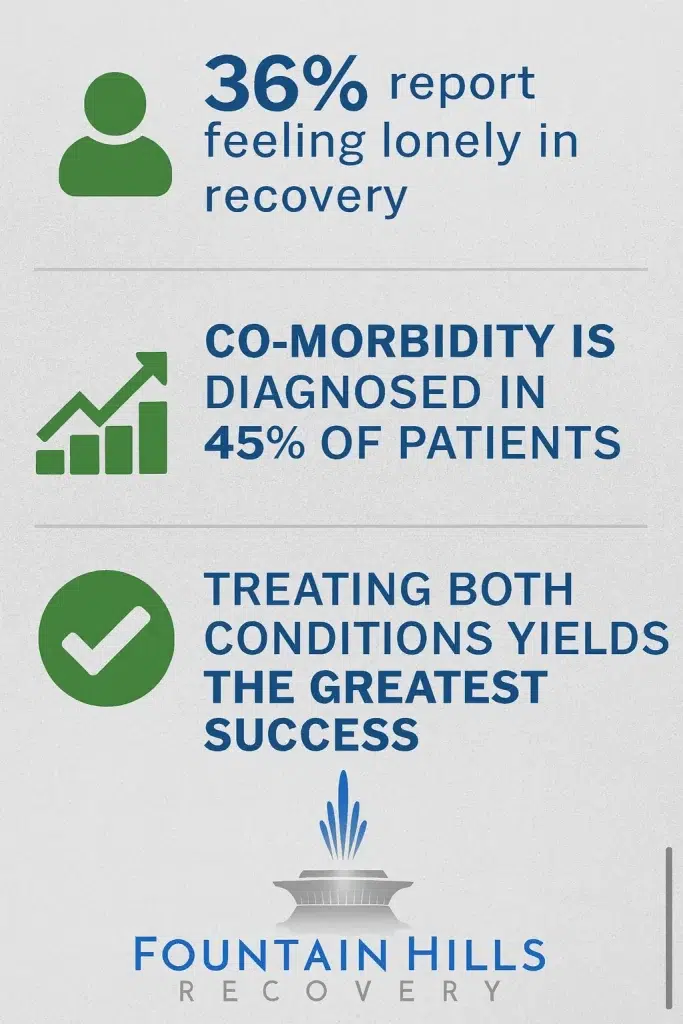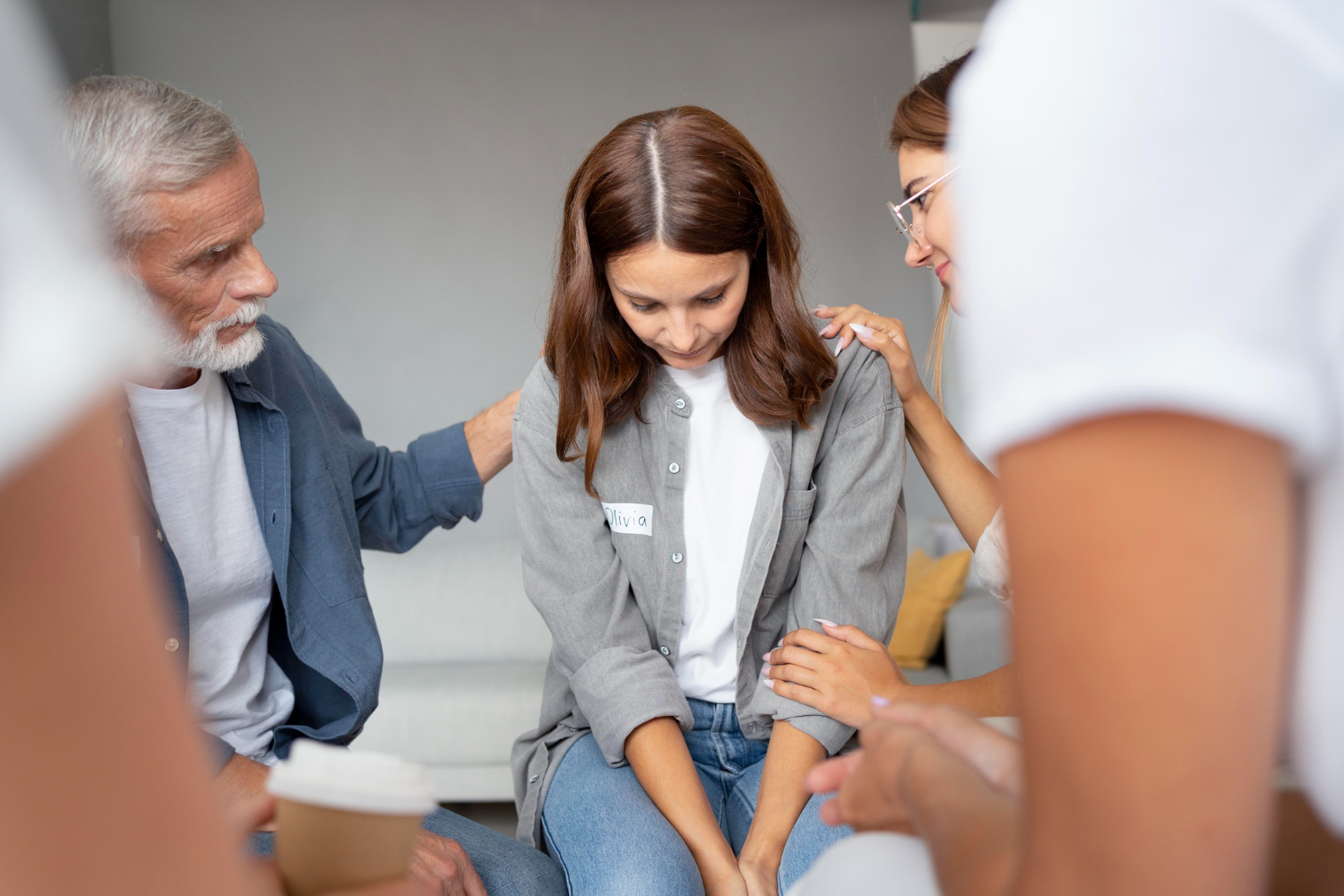There’s a kind of silence that follows getting sober. It can feel heavier than you expected. Scarier than the chaos you left behind. People talk about gratitude, clarity, second chances—but not enough about the crushing loneliness that creeps in when the noise of substance use stops.
If you’re in early recovery and feeling isolated, you’re not weak—and you’re definitely not alone.
At Fountain Hills Recovery, we meet people in this quiet ache every day. And we know that for many, it’s not just about missing people—it’s about trying to live in your skin without the shield substances used to offer. That’s why we offer dual diagnosis treatment: because loneliness in early sobriety is rarely just loneliness. It’s often the beginning of something deeper—and something treatable.
Why Does Sobriety Feel So Lonely?
You removed the thing that was numbing the pain—but not the pain itself.
Many people use substances to cope with depression, anxiety, or trauma—often without knowing those conditions by name. When the substance goes away, the mental health symptoms don’t disappear. In fact, they can get louder. You may suddenly notice how anxious you are in conversations, how hard it is to feel joy, or how unfamiliar your own thoughts feel.
You may have lost friends, cut ties with people who weren’t safe, or simply outgrown old relationships that revolved around using. What’s left is a wide emotional gap—and very few people talk about how painful that gap can be.
What Is Dual Diagnosis Treatment?
Dual diagnosis treatment is care that treats both substance use and mental health conditions—at the same time, in the same place.
This might include:
- Individual therapy to explore the root of your feelings
- Psychiatry or medication management if needed
- Group therapy to build connection with others who get it
- Trauma-informed care to address deep emotional wounds
- Ongoing clinical support that sees the full picture—not just the symptoms
At Fountain Hills Recovery, our dual diagnosis approach is rooted in compassion, clinical excellence, and a belief that people are not their diagnoses. You’re not just someone who “feels lonely”—you’re someone ready to heal.
How Does Dual Diagnosis Treatment Help With Loneliness?
Here’s what we’ve seen—over and over again:
Loneliness is often the body’s signal that something deeper needs care.
For many, it’s not just about missing others—it’s about never having had relationships that felt emotionally safe. Or about feeling too anxious or depressed to open up. Or about believing you’re too much, or not enough, or unlovable.
Dual diagnosis treatment helps you unpack all of that—not with judgment, but with clinical tools and real support. You begin by learning how your brain and body respond to stress, pain, and fear. You build awareness of how past trauma might shape present isolation. And most importantly, you start practicing connection again—in a space where it’s okay to be awkward, raw, or unsure.

“I’m Around People… But I Still Feel Alone.”
Yes. Because proximity isn’t the same as connection.
Emotional loneliness isn’t about how many people are around you—it’s about whether you feel seen, safe, and accepted. That can be hard to rebuild in early recovery. Especially when your nervous system is still learning how to exist without the chemical buffer of substances.
Dual diagnosis treatment helps you retrain your emotional responses, slow your spiraling thoughts, and name what you’re actually feeling—so you can start showing up as yourself, and letting others in.
“It took weeks before I could say anything real in group. But when I finally did, someone looked at me and said, ‘Me too.’ I think that saved me.”
– Outpatient Client, 2023
What If I’ve Felt Lonely My Whole Life?
This is where dual diagnosis care can be transformational.
If loneliness isn’t new, there’s likely a root. Maybe you experienced childhood trauma, emotional neglect, bullying, or grief. Maybe your brain simply processes the world differently—and no one ever made space for that. These stories matter. And they often get misdiagnosed, minimized, or ignored in treatment that only focuses on substances.
At Fountain Hills Recovery, we create space for your full story. Not just your addiction history, but the emotional and psychological layers underneath. Loneliness might be the beginning of your healing—not the end of the line.
What Makes Fountain Hills Recovery Different?
We know that treating addiction without treating the person is never enough.
Our facility is designed for emotional safety, clinical depth, and whole-person healing. We specialize in dual diagnosis care because we believe emotional pain is often what drives substance use—and loneliness is one of the most overlooked signals that pain is still present.
In our Fountain Hills, AZ setting, you’ll find:
- Trauma-informed clinicians who listen
- Peers who know what it feels like to hurt and hope
- A program that honors your pace, your identity, and your truth
- Real community—not forced positivity or fake smiles
Whether you’re from the Phoenix metro area or traveling for treatment, we offer a quiet space to rediscover who you are—and who you’re becoming.
FAQ: Dual Diagnosis and Loneliness in Recovery
Is it normal to feel lonelier after I stop using?
Yes. Many people report an emotional “crash” after getting sober. You’re not broken—you’re feeling feelings that were numbed for a long time. It’s part of the healing process.
How do I know if I need dual diagnosis treatment?
If you’re experiencing ongoing depression, anxiety, trauma symptoms, or emotional disconnection—especially alongside a history of substance use—dual diagnosis care may help. You don’t need a formal diagnosis to get support.
Can I join dual diagnosis treatment if I’m already sober?
Absolutely. You don’t need to be in active use to benefit. Many people come to us after detox or a short-term program when the deeper emotional work begins.
Will I make real friends in treatment?
Maybe not best friends forever—but yes, you’ll likely find people who see you, hear you, and make you feel less alone. Many alumni say these connections were more meaningful than anything they expected.
Does Fountain Hills Recovery offer outpatient options?
Yes. We offer a full continuum of care, including intensive outpatient programming (IOP), partial hospitalization (PHP), and residential options. All levels include integrated dual diagnosis support.
Ready to Feel Less Alone?
If sobriety feels lonelier than you expected, you’re not failing—it means you’re beginning to feel. That’s not a weakness. It’s a sign that healing is possible. And we’re here for it.
Call (800) 715-2004 or visit Fountain Hills Recovery’s dual diagnosis page to learn more about how our integrated care in Fountain Hills, AZ can help you reconnect—with yourself, and with others who truly get it.





